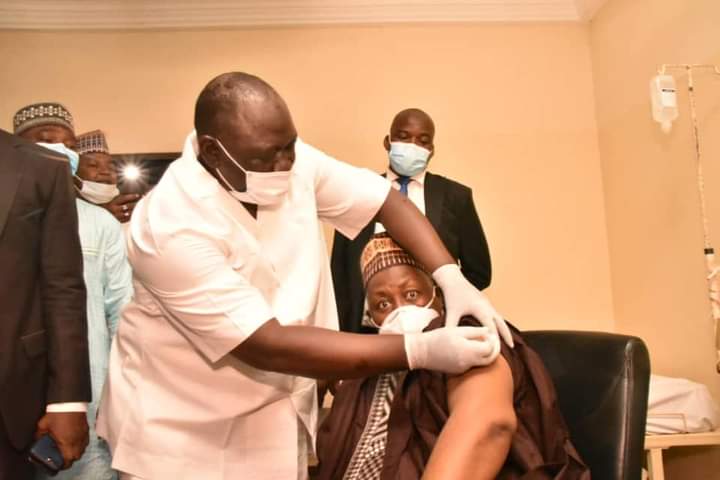Well-meaning Nigerians have called on the Federal Government to prioritise citizens’ health by decentralising and opening the COVID-19 vaccination process to private sector players to make it more efficient.
Using the decentralised COVID-19 testing process as a test case, Abiodun Adekoya, a Lagos-based entrepreneur, urged the Federal Government to create a framework that allows the private sector to provide vaccines to Nigerians that can afford it in a timely and convenient manner.
- After IPOB’s attack-on-sight directive: Police operatives live in fear in S’East
- Buhari appoints new DG for women devt centre
He said this would partly ease government’s uneasy burden of catering for almost 200 million citizens.
Narrating his ordeal at the Gbagada General Hospital, Abiodun said, getting vaccinated for COVID-19 is not easy. “They said, all you have to do is walk in, and you will be out in an hour maximum. It turns out to be wrong. I went in by 7:30 am, took a number and waited like a good Nigerian.
“I got there at 7:30 am, but hundreds of people were ahead of me, so I was not surprised when the vaccine was finished before it got to my number. Now, the Federal Government has asked all the states administering the COVID-19 vaccine to stop the exercise the moment they use half of the doses allocated to them. How do I get vaccinated?” The implication of this call to stop is clear. The government want to ensure that they can provide the second shot for those that have taken the first jab. Whilst this call is logical, it came in late. It introduces the fear that the government might not be assured of timely receipt of the second shipment of vaccines.”
Abiodun urged the Federal Government to allow state governments to collaborate with the private sector to ease the current vaccination constraint the same way they did with COVID-19 testing. This will reduce the federal government’s supply and distribution pressure and accelerate the vaccination of the population that is not yet prioritised but would like to protect themselves and their families.
He is not alone. Dimeji Abodunrin shares the same sentiment. Dimeji desperately wants to be vaccinated but has not been lucky despite consecutive visits to the primary health care centre near his home. He had to disregard a special arrangement that comes at a fee due because it is illegal. A black market for accelerated vaccination is beginning to emerge, Dimeji disclosed.
Dr. Betta Edu, Honourable Commissioner for Health in Cross River State, and the National Chairman of Nigeria Commissioners for Health Forum, has said allowing private sector participation would make procurement and administration of COVID-19 vaccines more accessible across the country.
According to Dr. Edu, the government cannot do it all. “We need to open the space and allow the private sector to come in. I am happy that when it comes to COVID-19 testing, especially for people who want to travel out of the country, the private sector has its place. The number one thing that will bring efficiency into the health sector is to open it up to other key stakeholders. There are many examples from all over the world. In India, they revolutionised their health care sector by opening the space,” she said.
Assessing the situation in Anambra State, the Honourable Commissioner for Health, Dr Vincent Okpala, expressed satisfaction with the response against the pandemic by the state government.
“We were happy and excited when we learnt about vaccine supply to different states by the Federal Government. But the 78,010 doses that came in is like a drop in the ocean. It will not be enough to take care of business because we want every resident to get vaccinated against COVID-19. Again, we are pleased and grateful that we received the doses currently being administered,” he said.
However, the issue is that 78,010 doses will cater for less than 1% of the Anambra populace. Many in the state require vaccination for safe international business travel – the mainstay of its economy. Already, the state has expended 19,300 out of the available doses and should exhaust its current stock by April 15.
While expressing optimism about the government’s plan to ensure continued access to vaccines, Dr Okpala said private sector intervention could improve access to vaccines nationwide. “If you look at what happened with COVID-19 testing, not using public resources to do travel testing makes sense. There is a growing efficiency that also came into that. Looking at that as a test case, one can argue for addressing the vaccine situation with the same principle.”
We caught up with the Divisional Head covering Health and Education Finance in Sterling Bank, Mr Obinna Ukachukwu. He believed that the government’s partnership with the private sector was the only practical means to effectively make vaccines available to the citizens.
Mr Ukachukwu noted that many healthcare workers could not leave work to go to the PHCs to take the vaccines, reflecting what will happen when there is a massive rollout. Nigerians should be able to access vaccines at their local diagnostic centres, pharmacies, and hospitals. The government should focus on regulation. It is that simple.
From an economic standpoint, Nigeria is already hugely indebted and cannot add to this debt burden by procuring and distributing vaccines entirely free.
The Health Sector finance expert suggested a pseudo insurance model where those that can pay will purchase these vaccines, whilst in the process, subsidising or eliminating the cost of vaccines for our frontline workers, elderly, and the vulnerable population. If the billions of Naira being budgeted for vaccines are really available, other areas of our health care system have a better need for it.

 Join Daily Trust WhatsApp Community For Quick Access To News and Happenings Around You.
Join Daily Trust WhatsApp Community For Quick Access To News and Happenings Around You.


